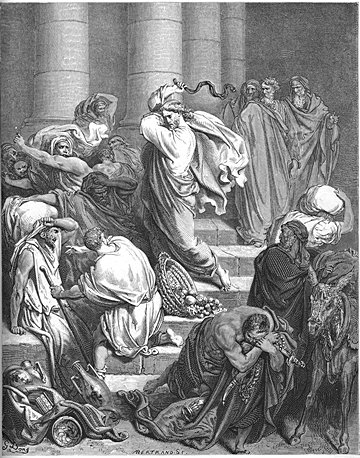Yohana 2
1 Pagamasile moŵa gaŵili wapali ulombela musi wa ku Kana chilambo cha ku Galilaya. Ni achikulugwe Che Yesu ŵaliji kweleko,
Two days after this there was a wedding at Cana in Galilee, and Jesus’ mother was there.
2 Che Yesu ni ŵakulijiganya ŵao nombe ŵalalichikwe ku ulombela wo.
Jesus himself, too, with his disciples, was invited to the wedding.
3 Pajamasile divai jiŵalingenye kwa ligongo lya ulombela, achikulugwe Che Yesu ŵansalile, “Nganakola divai!”
And, when the wine ran short, his mother said to him: “They have no wine left.”
4 Che Yesu ŵajanjile, “Nkaasalila chakupanganya, katema kangu kakanaŵe kwika.”
“What do you want with me?” answered Jesus. “My time has not come yet.”
5 Pelepo achikulugwe Che Yesu ŵaasalile achikatumetume, “Chachilichose chichansalile, mpanganye.”
His mother said to the servants: “Do whatever he tells you.”
6 Pelepo syapali lulo syekulungwa nsano ni umo sya maganga, lwaluli lose lwakombwele kugumbala lulo sya mwana siŵili pane sitatu sya meesi. Syaŵichikwe pelepo mpela itite pakusyoŵeleka kwa Ŵayahudi kutaga meesi ga kuliswejesya kwaligongo lya kwapopelela Akunnungu.
There were standing there six stone water-jars, in accordance with the Jewish rule of ‘purification,’ each holding twenty or thirty gallons.
7 Che Yesu ŵaasalile achikatumetume ŵala, “Ngumbasye meesi lulo syo.” Ni ŵanyawo ŵagumbesye ndendende.
Jesus said to the servants: “Fill the water-jars with water.”
8 Nipele ŵaasalile, “Sano ntechanje munjauchisye jwankulu jwa chindimba.” Ni ŵanjauchisye.
And, when they had filled them to the brim, he added: “Now take some out, and carry it to the Master of the Feast.” The servants did so.
9 Jwankulu jwa chindimba paŵajipasisye divai jijaliji meesi kundanda, nombejo nganakumanyilila kujikopochele divai jo, nambo achikatumetume ŵala ŵaimanyi. Jwankulu jwa chindimba jula ŵambilasile nlombela,
And, when the Master of the Feast had tasted the water which had now become wine, not knowing where it had come from — although the servants who had taken out the water knew —
10 ni kunsalila, “Mundu jwalijose kundanda akwapa ŵandu divai jambone ni ŵamalaga kung'wa ni kukolelwa akwapa janganong'a nnope. Nambo mmwejo ntupele divai jambone mpaka sambano.”
He called the bridegroom and said to him: “Every one puts good wine on the table first, and inferior wine afterwards, when his guests have drunk freely; but you have kept back the good wine till now!”
11 Chelechi chili chimanyisyo chakusimosya chandanda chiŵapanganyisye Che Yesu mmusi wa ku Kana chilambo cha ku Galilaya ni ŵaulosisye ukulu wao nombe ŵakulijiganya ŵao ŵaakulupilile.
This, the first sign of his mission, Jesus gave at Cana in Galilee, and by it revealed his glory; and his disciples believed in him.
12 Payamasile yeleyo, Che Yesu pamo ni achikulugwe ni achapwakwe ni ŵakulijiganya ŵao ŵala ŵatuluchile ku Kapelenaumu. Ŵatemi kweleko moŵa kanandi.
After this, Jesus went down to Capernaum — he, his mother, his brothers, and his disciples; but they stayed there only a few days.
13 Katema ka lyuŵa lyekulungwa lya Pasaka ja Ŵayahudi kaŵandichile ni Che Yesu ŵakwesile ku Yelusalemu.
Then, as the Jewish Passover was near, Jesus went up to Jerusalem.
14 Pa Nyuumba ja Akunnungu ŵaasimene ŵandu achisumisyaga ng'ombe ni ngondolo ni nguunda ni ŵakutindanya mbiya ali atemi.
In the Temple Courts he found people who were selling bullocks, sheep, and pigeons, and the money-changers at their counters.
15 Ŵapotile ngonji ni kuŵa lubokola ni ŵaaŵinjile wose paasa pa Nyuumba ja Akunnungu pamo ni ng'ombe ni ngondolo syao. Ni ŵapikulenye mesa sya ŵakutindanya mbiya ŵala ni kumwasya mbiya syao.
So he made a whip of cords, and drove them all out of the Temple Courts, and the sheep and bullocks as well; he scattered the money of the money-changers, and overturned their tables,
16 Ni ŵaŵaliji nkusumisya nguunda ŵala ŵaasalile, “Ntyosyanje pelepa indu yi. Nkajipanganya nyuumba ja Atati ŵangu kuŵa nyuumba jakusumichisya malonda!”
and said to the pigeon-dealers: “Take these things away. Do not turn my Father’s House into a market-house.”
17 Ŵakulijiganya ŵao ŵakumbuchile kuti, malembelo gakusala, “Alakwe Akunnungu, unonyelo wangu kwa nyuumba jenu ukundinisya mpela mooto mu ntima.”
His disciples remembered that Scripture said — ‘Zeal for thy House will consume me.’
18 Ilongola ŵa Ŵayahudi ŵausisye Che Yesu, “Ana chimpanganye chimanyisyo chachi chakusimosya chakutulosya kuti nkwete lilamulo lya kupanganya yelei?”
Upon this the Jews asked Jesus: “What sign are you going to show us, since you act in this way?”
19 Che Yesu ŵaasalile, “Ngumulanje Nyuumba ja Akunnungu ji, ni uneji chindaŵe kwa moŵa gatatu pe.”
“Destroy this temple,” was his answer, “and I will raise it in three days.”
20 Pelepo Ŵayahudi ŵala ŵatite, “Aji Nyuumba ja Akunnungu ji twataŵile kwa yaka makumi ncheche konjechesya nsano ni umo. Ana mmwejo chinkombole chinauli kujitaŵa kwa moŵa gatatu?”
“This Temple,” replied the Jews, “has been forty-six years in building, and are you going to ‘raise it in three days’?”
21 Nambo Nyuumba ja Akunnungu jiŵajigambaga Che Yesu jo jaliji chiilu chakwe nsyene.
But Jesus was speaking of his body as a temple.
22 Nipele Che Yesu paŵasyuchile, ŵakulijiganya ŵao ŵakumbuchile kuti ŵaŵechete gelega, ni ŵagakulupilile Malembelo ga Akunnungu ni maloŵe gaŵaŵechete Che Yesu gala.
Afterwards, when he had risen from the dead, his disciples remembered that he had said this; and they believed the passage of Scripture, and the words which Jesus had spoken.
23 Che Yesu paŵaliji ku Yelusalemu mmoŵa ga chindimba cha Pasaka ŵandu ŵajinji paŵaiweni imanyisyo iŵaipanganyisye ŵaakulupilile.
While Jesus was in Jerusalem, during the Passover Festival, many came to trust in him, when they saw the signs of his mission that he was giving.
24 Nambo Che Yesu nganalilechelelaga kukwao pakuŵa ŵajimanyilile mitima jao
But Jesus did not trust himself to them, since he could read every heart,
25 ni pakuŵa ŵaimanyilile uchenene yaili mmitima jao, nganasaka kusalilwa chachilichose nkati ŵandu ŵane.
and because he did not need that others should tell him what men were; for he could of himself read what was in men.





















